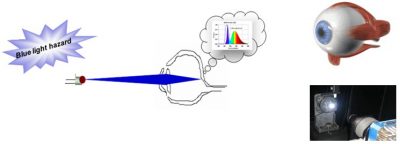Definition of Photobiosafety:
Photobiological safety means that the light emitted by various lamps and lamp systems (including various light-emitting devices) cannot have harmful radiation effects on living things (mainly humans). According to the wavelength of radiation and the physiological visual effects of the human eye, optical radiation can be divided into three parts: ultraviolet radiation, visible light and infrared radiation.

IEC62471-2006(CIE S009) Photobiological Safety of Lamps and Lamp System and IEC TR62471-2(2009) Guidance on Manufacturing Requirements Relating to Non-laser Optical Radiation Safety have be published addressing hazard to human (mostly eye and skin), and are completely suitable to assess the optical radiation safety of non-laser sources, such as LED products, UV radiation in general lighting products and etc.
Standard:
The LED Photobiological Radiation Safety Test System is also according to IEC/EN 62471/CIE S009, IEC/TR 62778, GB/T 20145, IEC/EN 60598 Annex P, IEC/EN 60432, IEC/EN 60335, GB 7000.1and 2009/125/EC.
Photobiological safety test scope and test parameters:
The optical radiation safety test system mainly measures the spectral power distribution, radiance, irradiance, radiation exposure, specific effective radiant ultraviolet power (mW/ klm), illuminance, radiation exposure, apparent source size, correlated color temperature, chromaticity coordinates, color rendering index and color tolerance, etc. Its test parameters include UV hazard-weighted irradiance, near-ultraviolet radiation, retinal blue light hazard-weighted radiation, retinal thermal hazards, infrared radiation, visible and infrared radiation, etc. The lamps under test can be classified according to the photobiological hazard value.
Why do photobiosafety testing
Photobiological studies in recent years have shown that light radiation is closely related to human health. Whether it is ultraviolet light, visible light, or infrared light, if it is improperly irradiated, it will cause direct or potential harm to human physiology. UV Hazards: To the eyes: photokeratitis, photoconjunctivitis, cataracts. For skin: erythema (short term), skin cancer (long term) Blue light hazard: retinitis. Visible and infrared light hazards: burns, erythema effect, cataracts.
Basis for Photobiosafety
The assessment and control of optical radiation hazards for lamps and lamp systems is more complex than for single-wavelength laser systems. In order to evaluate a broadband light source, such as an arc lamp, incandescent lamp, fluorescent lamp, array lamp or lamp system, it is first necessary to determine the spectral distribution of the optical radiation emitted by the light source at the point or points closest to the person. The size of the projection or the size of the projection must be specified in the retinal hazard spectral region; finally, the irradiance and effective radiance as a function of distance must be determined. Therefore the standard IEC/EN 62471 (GB 20145) was developed to evaluate the radiation hazards associated with lamps and lamp systems.
The hazard exposure level of optical radiation may be related from 200nm to 3000nm. It is based on the measurement of spectral irradiance and spectral radiance in specified measuring geometry relating with exposure duration.

Led Radiation Safety Test
The IEC 62471 measurement equipment is specialized for the optical radiation hazard exposure level measurement in IEC 62471.
• Actinic UV hazard exposure (weighted irradiance from 200nm to 400nm) for the skin and eye
• Near-UV hazard exposure (irradiance from 315nm to 400nm) for the eye
• Retinal blue light hazard exposure (weighted radiance from 300nm to 700nm)
• Retinal Blue light hazard exposure(weighted irradiance, 300-700nm) – small source
• Retinal thermal hazard exposure (weighted radiance from 380nm to 1400nm)
• Retinal thermal hazard exposure (weighted radiance; 780-1400nm) – weak visual stimulus
• Infrared radiation hazard exposure (irradiance from 780nm to 3000nm) for the eye
• Thermal hazard exposure (irradiance from 380nm to 3000nm) for the skin
Working Principle:
The system mainly consists of a UV-VIS-IR spectroradiometer, a retina radiance meter for the measurement of spectral radiance, a light receiver for the measurement of spectral irradiance, a motorized two-axis rotation goniometer for the measurement of spatial maximum exposure value, an optical rail for the measurement at 200mm and 500lx condition of general lighting sources, calibrated sources of spectral irradiance with the wavelength from 200nm to 3000nm and that of spectral radiance with the wavelength from 300nm to 1400nm. According to IEC62471, this system is advantageous specially to evaluate the safety class of various non-laser radiation sources, especially for the measurement of weighted radiance within related 1.7mrad to 110mrad fields of viewing and irradiance in the specified receiving angles, the determination of maximum exposure related to hazard classification in the space and corresponding apparent source, etc.
Lisun Instruments Limited was found by LISUN GROUP in 2003. LISUN quality system has been strictly certified by ISO9001:2015. As a CIE Membership, LISUN products are designed based on CIE, IEC and other international or national standards. All products passed CE certificate and authenticated by the third party lab.
Our main products are Goniophotometer, Integrating Sphere, Spectroradiometer, Surge Generator, ESD Simulator Guns, EMI Receiver, EMC Test Equipment, Electrical Safety Tester, Environmental Chamber, Temperature Chamber, Climate Chamber, Thermal Chamber, Salt Spray Test, Dust Test Chamber, Waterproof Test, RoHS Test (EDXRF), Glow Wire Test and Needle Flame Test.
Please feel free to contact us if you need any support.
Tech Dep: Service@Lisungroup.com, Cell/WhatsApp:+8615317907381
Sales Dep: Sales@Lisungroup.com, Cell/WhatsApp:+8618117273997
Your email address will not be published. Required fields are marked *